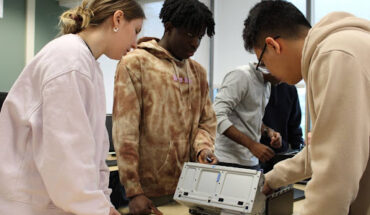(Photo credit: Natalia Kolenko/Fourth Estate)
Over 200 members of the scholarly publishing industry met for a conference on Mason’s Fairfax campus April 19-22 to discuss the quickly evolving world of scholarly publishing.
The conference, known as the Open Scholarship Initiative Conference, or OSI Conference, was the first of its kind, stemming from an organization created a year and a half ago. The organization, OSI, first existed as an online forum that was composed of Google groups and listservs whose members signed on to discussed ways to democratize science scholarship. However, as discussion evolved, OSI members opted for a face-to face meeting, according to National Science Communication Institute (nSCI) founder Glenn Hampson.
Partnering with organizations such as the United Nations Educational, Scientific, and Cultural Organization (UNESCO) and nSCI, the OSI Conference included 220 delegates representing 15 stakeholder groups in the scholarly publishing industry.
Currently, scholarly publishing is at a crossroads, thanks to the influx of technological innovation, the development of social media and the overwhelming amount of content available to the public. As a result, new problems about the way research gets shared, assessed and issued are rising. Aspects of the scholarly publishing world — such as accessibility, journal prices, copyright infringement, publishing fraud and peer review — are affecting stakeholder groups in different ways, often dividing groups in this industry. These divisions could ultimately have a global impact on economic growth, education, scientific consensus and public policy, according to Hampson and other organizers of the conference.
A 10-year initiative of meetings between high stakeholders from all spectrums of the publishing world, OSI is an attempt to solve these problems. According to its founders, OSI is characterized as one of the first instances where stakeholders — such as writers, editors, publishers and graphic artists — come together to talk publishing reform.
Eric Olsen, OSI conference coordinator, said Mason was the ideal place to host the first OSI Conference.
“Mason has been the perfect host for OSI 2016,” Olsen said. “It’s a research institution with the logistics necessary to make the conference successful. Both the staff and students have been very enthusiastic and supportive. UNESCO has seen the value in our project and has even gone as far as [to] offer scholarships for travel and hotel accommodations for delegates who would otherwise be unable to attend due to a lack of financial services.”
Hampson said this conference is important to undergraduate students because it may be a catalyst for change in the publishing landscape.
“It may not affect you [undergraduates] now, but it will later,” Hampson said. “To be a true scholar or researcher, one must know what it means to be published and how to find the correct information available. In grad school, you [students] may find a very different publishing world — one where you can go to your advisor and say you’re ready to publish your first research journal. They will then have a laid-out plan for you where you can completely receive credit for it, where it will be accessed by a broad audience, and it won’t bankrupt you or the university. I cannot currently say this now of the current publication system.”
Hampson said studies done within the past 10 years, or even five, are rendered almost useless because there is no way for scholars to effectively access all available research. Different scholarly groups lack a universal system with which to access each other’s research, which can delay innovation and consensus.
In terms of future plans, OSI’s organizational committee hopes to continue the initiative by hosting a conference at a different university each year and by encouraging networking relationships outside of the conference. Although the initiative is still in its early stages, Olsen thinks the conference has the potential to bring steady change to the media world by defining mediums between parties, asking complex questions and answering those questions with tangible and realistic responses.
John Warren, organization committee member and the head of Mason Publishing Group/George Mason University Press, has high hopes for what OSI will become by 2025.
“It would amaze me to see more openness within the publishing world,” Warren said. “To have publishers circulate and distribute information without going out of business and to allow people to be more entrepreneurial.”




